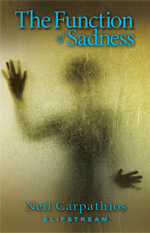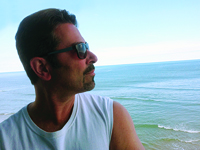
The Function of Sadness
Copyright 2015 by Neil Carpathios
|
"One of the great scenes in The Odyssey takes place in the underworld when the shade of Achilles pleads to know from Odysseus "the news about my gallant son...Did the boy become a champion—yes or no?" The poems in this prize-winning little book by Neil Carpathios make that answer a resounding, Yes. "Being a surgeon's son has its perks," the poet-son says. "I developed x-ray vision,/could see through everyone," the way his father knew the secrets of our bodies. The son's search, however, is through poetry, "To locate/the thing we call love/like an exotic, bright fish/never really spotted/swimming inside us." And like Achilles, how proud the father would be to know of his son's new book, these generous, imaginative, and touching poems that seek to "understand/the origin of all tears." "Kudos," he would say, and so do I."
—Bruce Guernsey
author of From Rain: Poems, 1970-2010
and former editor of The Spoon River Poetry Review
|
Neil Carpathios

Neil Carpathios is the author of three full-length poetry collections: Playground of Flesh (Main Street Rag), At the Axis of Imponderables (winner of the Quercus Review Press Book Award), and Beyond the Bones (FutureCycle Press). He is the editor of the anthology, Every River on Earth: Writing from Appalachian Ohio (Ohio University Press, 2015).
His newspaper column, Let's Talk Poetry, appears weekly in the Portsmouth Daily Times and online, and strives to showcase the works of poets in southern Ohio and around the country. He is an associate professor of English and Coordinator of Creative Writing at Shawnee State University in Portsmouth, Ohio.
|
|
The Man with No Future
was the title of the play, we decided,
as we watched him crack open
his fortune cookie
but there was nothing inside,
so he called the waitress back
who brought him another cookie
he snapped in half only to find
it also empty, his face puzzled
then scared then relieved,
so unrehearsed we thought,
as he looked at his watch
then balled up his napkin
and stood up, starting to walk,
peeking one more time,
maybe for us,
over his shoulder
at the cookie shards
like ancient relics in a museum
on his plate.
Copyright ©2015 Neil Carpathios
"Pain is Weakness Leaving the Body"
I read on the back of my step-sonís shirt,
given to him
by the Marine recruiter.
But Iíve never seen it leave,
even when my fatherís bone tore through
his shin and he screamed, almost operatic,
in the yard.
Or when
Jimmy Galloway chopped his thumb off
in woodshop and blood
shot out
and we stood, our mouths agape.
Or my own
sprained ankles,
colonoscopy,
cracked ribs.
Is it a perfect replica,
a body within our body,
pushing like a chick
till it hatches,
invisible, like a ghost?
Does it fly to the moon?
Does it swan-dive into grass?
Does it seek other weakness
to join hands and dance?
I wonder if the saying rises
from memory, in a kid who wore the shirt
proudly, if it helps as he squirms
on dirt, his chest ripped open by a bomb,
his one eye searching the sky
for weakness leaving his body
as his other eye rolls away like a marble?
Copyright ©2015 Neil Carpathios
|
The Afterlife
Two boys found her on the beach
and started performing surgery,
popping out glassy eyes,
unscrewing the head.
Others noticed and huddled close
to watch. The boys let a little girl
with a striking resemblance
take the head and she sat
under an umbrella pulling a comb
through long blond hair.
A seagull swooped, plucked
an eyeball that rolled away.
The arms came off.
The boys stuck them in sand
so it looked as if
a buried person were clawing
her way up from deep
in the earth.
They threw legs back
and someoneís dog dived into surf
fetching one, which made
everyone laugh.
Then the sun sank.
Nobody stayed.
Waves kept rolling.
All that remained was the torso
like a space craft or an ark,
which nobody wanted,
but soon small creatures
arrived, arm and leg sockets
round doors
for easy access and escape.
Copyright ©2015 Neil Carpathios
|
|



